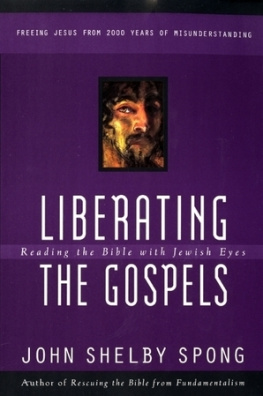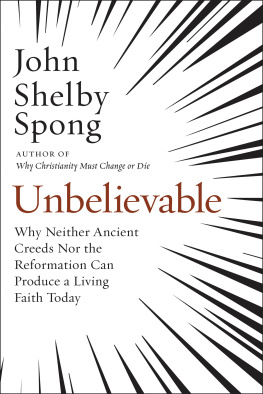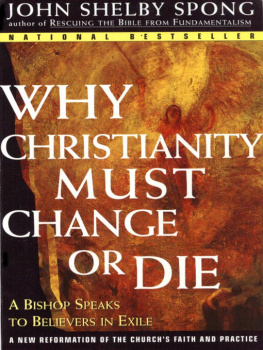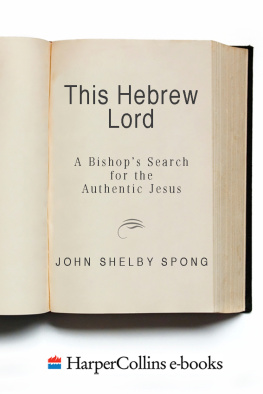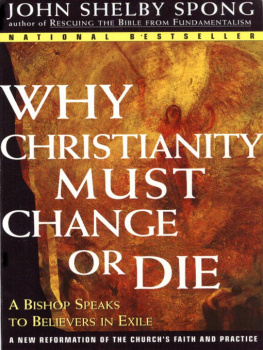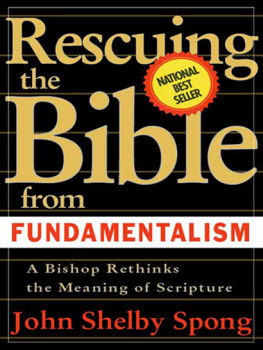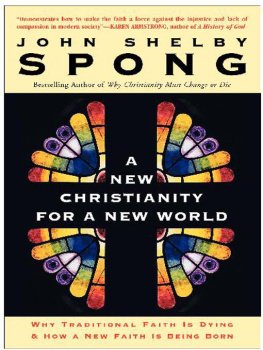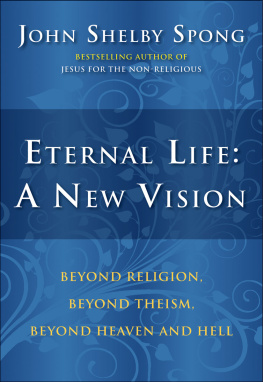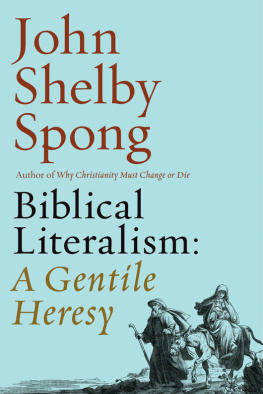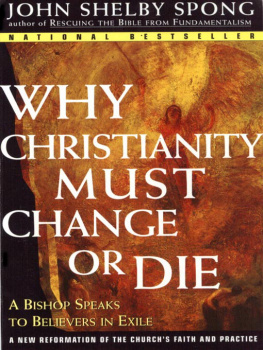John Shelby Spong - Eternal Life: A New Vision: Beyond Religion, Beyond Theism, Beyond Heaven and Hell
Here you can read online John Shelby Spong - Eternal Life: A New Vision: Beyond Religion, Beyond Theism, Beyond Heaven and Hell full text of the book (entire story) in english for free. Download pdf and epub, get meaning, cover and reviews about this ebook. year: 2009, publisher: HarperCollins, genre: Religion. Description of the work, (preface) as well as reviews are available. Best literature library LitArk.com created for fans of good reading and offers a wide selection of genres:
Romance novel
Science fiction
Adventure
Detective
Science
History
Home and family
Prose
Art
Politics
Computer
Non-fiction
Religion
Business
Children
Humor
Choose a favorite category and find really read worthwhile books. Enjoy immersion in the world of imagination, feel the emotions of the characters or learn something new for yourself, make an fascinating discovery.

- Book:Eternal Life: A New Vision: Beyond Religion, Beyond Theism, Beyond Heaven and Hell
- Author:
- Publisher:HarperCollins
- Genre:
- Year:2009
- Rating:3 / 5
- Favourites:Add to favourites
- Your mark:
- 60
- 1
- 2
- 3
- 4
- 5
Eternal Life: A New Vision: Beyond Religion, Beyond Theism, Beyond Heaven and Hell: summary, description and annotation
We offer to read an annotation, description, summary or preface (depends on what the author of the book "Eternal Life: A New Vision: Beyond Religion, Beyond Theism, Beyond Heaven and Hell" wrote himself). If you haven't found the necessary information about the book — write in the comments, we will try to find it.
Eternal Life: A New Vision: Beyond Religion, Beyond Theism, Beyond Heaven and Hell — read online for free the complete book (whole text) full work
Below is the text of the book, divided by pages. System saving the place of the last page read, allows you to conveniently read the book "Eternal Life: A New Vision: Beyond Religion, Beyond Theism, Beyond Heaven and Hell" online for free, without having to search again every time where you left off. Put a bookmark, and you can go to the page where you finished reading at any time.
Font size:
Interval:
Bookmark:
Beyond Religion, Beyond Theism, Beyond Heaven and Hell

This book is dedicated to those special people who through
their deaths taught me not only how to die, but more
importantly, how to live and how to hope for life beyond
this life. Each is described in the preface along with a
brief statement about what their gifts were to me.
John Hunter Griffith (18681935)
John Shelby Spong (18891943)
Malcolm Linwood (Buck) Baker (19441958)
Shari Ann Rountree (19611963)
Carol Faye Terry (19521966)
Cornelia Bertha Marie Brauer Newton (19261971)
James Grayson Campbell (19291976)
Joan Lydia Ketner Spong (19291988)
Doolie Boyce Griffith Spong (19071999)
Emily Jane Failla (19822006)
John Harvie Knight (19602006)
Rosalie Suzanne (Rozanne) Garrett Epps (19222008)
I am in debt to each of them.
JSS
Setting the StageA Necessary Personal Word
Life Is Accidental
All Life Is Deeply Linked
Dancing with Death: The Discovery of Mortality
The Lure of Religion
Lifes Dominant Drive: Survival
Religions Role in the Fear of Death
The Faces of Religion
The Tools of Religious Manipulation
Ridding Religion of Both Heaven and Hell
Putting Away Childish Things: The Death of Religion
The Shift of the Religious Paradigm
Who Am I? What Is God?
The Approach of the Mystics
Resurrection: A Symbol and a Reality
HidingThinkingBeing
I Believe in Life Beyond Death
Defining the Choice to Die
This may well be my final book! It is appropriate that it be about final things, and it is.
Yes, I know I have said final book before. This is indeed my fifth final book. I have even written my autobiography. One is supposed to die after an autobiography is either written or published. I did not do that. Instead I went on to have what were probably the most exciting and creative years of my life both professionally and personally. During that time I wrote three other books. When this book comes out I will be in the seventy-ninth year of my life and, while I do not doubt that others can maintain far beyond that age the intellectual rigor and personal discipline that it takes to write books of great skill and competence, I couple my age with the fact that in this book the major themes of my writing career culminate. Eternal Life: A New Vision serves to close a circle around which I have been walking for some time and thus provides a proper conclusion to this phase of my life.
To write another book would inevitably force me to move into an entirely new field of study in a meaningful way. My experience has been that the subject of the next book is always opened to me by the study done in preparation for the present book, so that the new book seems to be but another chapter developing or perhaps expanding a similar theme. I must confess that although this also seemed to occur in the writing of this book, the new subject was so vast and my previous engagement with it so slight, that it would take years to master the necessary material to dare to write about it. Because that kind of time is simply not available to me and my ability to undertake the necessary study is limited, I can only file these new insights and directions by title and invite someone else in succeeding generations to make them the area of his or her expertise. So let me simply note for history that this book on life after death drove me deeply and in a new way into the Fourth Gospel.
I have previously been put off by the Christology of Johns Gospel, which has always seemed to me to suggest that Jesus was the presence of an external deity pretending to be a human being. I am aware of how influential Johns Gospel has been in Christian history in the formation of such doctrines as the Incarnation and the Holy Trinity. That kind of Christology, I have argued, has become all but inoperative in the light of the insights of Copernicus, Galileo, Newton, Darwin, Freud and Einstein, with which the Christian faith must contend if it wishes to engage the real world of today. When, however, my study for this book led me into the theme first of consciousness and then of self-consciousness, heightened consciousness, and finally into universal consciousness, Johannine statements attributed to Jesus, like The Father and I are one and If you have seen me, you have seen the Father, began to make sense for me in a new way. It was then that I wished that I might be a Johannine scholar and write on Johns Gospel from this new perspective.
A second facet of this was that as I was working on this book, I also became further convinced that Johns Gospel was written on the basis of an early Jewish three-year lectionary and that if we could place its content back into that context, it would read very differently from the way most Christians read it today. This means that despite the brilliance of people like C. H. Dodd, Edwyn Hoskyns, William Temple and Raymond Brown, just to name a few of the major Johannine scholars that I have read, the key to understanding this gospel has not yet been fully discovered, or even fully engaged. To see John first as a Jewish lectionary book and then to view it, not incarnationally, but through the eyes of heightened consciousness and the mystical perspective of seeing life united with the divine and sharing in eternity is, I believe, that key. To walk through this door would also mean that people would be led to see Jesus essential identification with God not in incarnational terms, but as a new level of human consciousness. That constitutes not just an appropriate and new direction, but a flashing, even blindingly bright, new understanding. I will develop these ideas, but only briefly, in my final chapters of this book, but this was the experience that caused me to wish that I had the background and the time to look at the entire Fourth Gospel through this new lens. Christianity is for me no longer about an invasive deity; it is about a fully human one in whom God becomes profoundly present and inherently visible. The author of Johns Gospel, I am now convinced, saw that and understood it. That is why this gospel is so very different from any other book in the New Testament. I simply file this titillating clue to the Fourth Gospel, to which attention must and will be paid in the future. Others surely will develop this possibility, and when they do, they will write this powerful Jesus story in a new and exciting way. If I could count on living five more years, I would surely want to do it myself. I indeed may try. Through this preface, however, I encourage others to engage this study and to walk this path. I will rejoice in their future success. With this caveat stated I can now say, without fear of contradiction, that unless something I have already written winds up being published, this is probably my final book.
It is in fact a kind of death experience itself to acknowledge that with the publication of this volume my career as the author of books may be now complete. I will continue writing my weekly Internet column as long as I am able and as long as my subscribers indicate that they want me to do so by continuing their subscriptions, but I doubt that more books will flow from my fountain pen onto legal pads, both of which mark me as a product of a previous generation. Twenty-two volumes, three of them coauthored, and translations now in most of the languages of Europe, plus Korean, Arabic and Indonesian, constitute a cohesive body of data sufficient to call it a career. Every author wonders how his or her contributions will be judged. I suspect that if future generations notice me at all, they will say, not what some of my critics say today, He is too radical, but rather, He was not nearly radical enough. I see future thinkersyes, overtly Christian thinkersalready on the horizon and eager to go to places in their writing that it has not yet occurred to me to walk. I think especially of such people as Gretta Vosper in Ontario, Ian Lawton in Michigan, Eric Elnes in Nebraska, Carlton Pearson and Robin Meyers in Oklahoma, Jeff Proctor-Murphy and David Felten in Arizona, Hugh Dawes in England and Greg Jenks in Australia (Brisbane), whom I regard as the most creative church-related voices in the next generation. Each will make an enormous impact on the emerging Christian world. While that assessment of the gifts these people have to bring is clear to me now, time will surely make it clear to countless others. I have in my career pressed this Christian faith story, which I love so deeply, to the limits of my ability. I rejoice that I might have helped others to go even beyond my limits. Every person must live within the boundaries of his or her own time in history. I have built bridges from my Christian past into a new Christian future. I am pleased that in this book I believe I have come to the place where I can actually see into another realm, and just seeing it is quite enough for me.
Font size:
Interval:
Bookmark:
Similar books «Eternal Life: A New Vision: Beyond Religion, Beyond Theism, Beyond Heaven and Hell»
Look at similar books to Eternal Life: A New Vision: Beyond Religion, Beyond Theism, Beyond Heaven and Hell. We have selected literature similar in name and meaning in the hope of providing readers with more options to find new, interesting, not yet read works.
Discussion, reviews of the book Eternal Life: A New Vision: Beyond Religion, Beyond Theism, Beyond Heaven and Hell and just readers' own opinions. Leave your comments, write what you think about the work, its meaning or the main characters. Specify what exactly you liked and what you didn't like, and why you think so.

